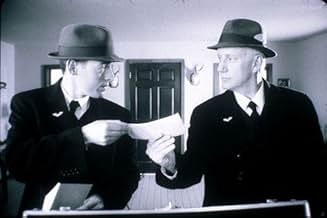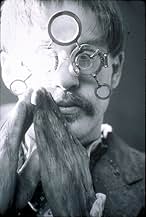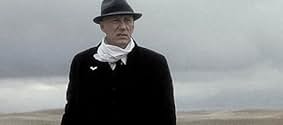ÉVALUATION IMDb
6,2/10
5,6 k
MA NOTE
Ajouter une intrigue dans votre langueSet in 1955, the residents of a small Montana community are forced to move their homes to make way for a new dam.Set in 1955, the residents of a small Montana community are forced to move their homes to make way for a new dam.Set in 1955, the residents of a small Montana community are forced to move their homes to make way for a new dam.
- Prix
- 3 victoires et 3 nominations au total
Josh Barker
- Matt
- (as Joshuin Barker)
Mike J. Regan
- Flaco
- (as Mike Regan)
Histoire
Le saviez-vous
- AnecdotesMr Stalling says that he is waiting for a sign from God, when Walter O'Brien visits him at the ark. Walter imparts a tale about when the water has risen, men will come by in a boat to take him and the two Mrs Stallings's to safety. They will not go, because they are waiting for a sign and they will drown. And God will say, I sent you a boat, what more did you want? This story also appears in the The West Wing season one episode "Take This Sabbath Day" and is told by the Karl Malden character, Father Thomas Cavanaugh.
- GaffesWhen Eddie and Arnold pay a visit to Jigger, after he stops shooting at them, Eddie and Arnold approach him. Jigger is sitting in a chair and holding a shotgun on his lap and not moving. A few shots later, the shotgun is in upright position with the butt on the ground. After they look at Jigger's feet, there's no sign of the shotgun so he must be holding it on his lap, again.
- Citations
Father Harlan: We are all angels. It is what we do with our wings that separates us.
- Générique farfeluJohn Tuell special thanks
- Bandes originalesAlways Late (With Your Kisses)
Performed by Lefty Frizzell
Written by Lefty Frizzell and Blackie Crawford
Courtesy of Columbia Records
By arrangement with Sony Music Licensing
Commentaire en vedette
"It all depends on how you look at it we are either halfway to heaven or halfway to hell," says the priest Rev. Harlan in "Northfork." The Polish brothers' film is an ambitious one that will make any intelligent viewer to sit up, provided he or she has patience and basic knowledge of Christianity. The layers of entertainment the film provide takes a viewer beyond the surreal and absurd imagery that is obvious to a less obvious socio-political and theological commentary that ought to provoke a laid-back American to reflect on current social values. The film's adoption of the surreal (coffins that emerge from the depths of man-made lakes to float and disturb the living, homesteaders who nearly "crucify" their feet to wooden floor of their homes, angels who need multiple glasses to read, etc.) and absurd images (of half animals, half toys that are alive, of door bells that make most delicate of musical outputs of a harp, a blind angel who keeps writing unreadable tracts, etc.) could make a viewer unfamiliar with the surreal and absurdist traditions in literature and the arts to wonder what the movie is un-spooling as entertainment. Though European cinema has better credentials in this field, Hollywood has indeed made such films in the past in "Cat Ballou", Lee Marvin and his horse leaned against the wall to take a nap, several decades ago. "Northfork," in one scene of the citizens leaving the town in cars, seemed to pay homage to the row of cars in "Citizen Kane" taking Kane and his wife out of Xanadu for a picnic.
The film is difficult for the uninitiated or the impatient film-goerthe most interesting epilogue (one of the finest I can recall) can be heard as a voice over towards the end of the credits. The directors seem to leave the finest moments to those who can stay with film to the end. If you have the patience you will savor the layers of the filmif you gulp or swallow what the Polish bothers dish out, you will miss out on its many flavors.
What is the film all about? At the most obvious layer, a town is being vacated to make way for a dam and hydroelectric-project. Even cemeteries are being dug up so that the mortal remains of the dead can be moved to higher burial grounds. Real estate promoters are hawking the lakeside properties to 6 people who can evict the townsfolk. Of the 6, only one seems to have a conscience and therefore is able to order chicken broth soup, while others cannot get anything served to them.
At the next layer, you have Christianity and its interaction on the townsfolk. Most are devout Christians, but in many lurk the instinct to survive at the expense of true Christian principles, exemplified in the priest. Many want to adopt children without accepting the responsibilities associated with such actions.
At the next layer, you have the world of angels interacting with near angelic humans and with each other. You realize that the world of the unknown angel who keeps a comic book on Hercules and dreams of a mother, finds one in an androgynous angel called "Flower Hercules." While the filmmaker does give clues that Flower is an extension of the young angel's delirious imagination, subsequent actions of Flower belie this option. You are indeed in the world of angels--not gods but the pure in spiritand therefore not in the world of the living. The softer focus of the camera is in evidence in these shots.
At another layer the toy plane of Irwin becomes a real plane carrying him and his angels to heaven 1000 miles away from Norfolk.
The final layer is the social commentary"The country is divided into two types of people. Fords people and Chevy people." Is there a difference? They think they are different but both are consumerist.
To the religious, the film says "Pray and you shall receive" (words of Fr Harlan, quoted by Angel Flower Hercules). To the consumerist, the film says "its what we do with our wings that separate us" (each of the 6 evictors also have wings-one duck/goose feather tucked into their hat bands but their actions are different often far from angelic as suggested by the different reactions to a scratch on a car).
The film is certainly not the finest American film but it is definitely a notable path-breaking work--superb visuals, striking performances (especially Nick Nolte), and a loaded script offering several levels of entertainment for mature audiences.
The film is difficult for the uninitiated or the impatient film-goerthe most interesting epilogue (one of the finest I can recall) can be heard as a voice over towards the end of the credits. The directors seem to leave the finest moments to those who can stay with film to the end. If you have the patience you will savor the layers of the filmif you gulp or swallow what the Polish bothers dish out, you will miss out on its many flavors.
What is the film all about? At the most obvious layer, a town is being vacated to make way for a dam and hydroelectric-project. Even cemeteries are being dug up so that the mortal remains of the dead can be moved to higher burial grounds. Real estate promoters are hawking the lakeside properties to 6 people who can evict the townsfolk. Of the 6, only one seems to have a conscience and therefore is able to order chicken broth soup, while others cannot get anything served to them.
At the next layer, you have Christianity and its interaction on the townsfolk. Most are devout Christians, but in many lurk the instinct to survive at the expense of true Christian principles, exemplified in the priest. Many want to adopt children without accepting the responsibilities associated with such actions.
At the next layer, you have the world of angels interacting with near angelic humans and with each other. You realize that the world of the unknown angel who keeps a comic book on Hercules and dreams of a mother, finds one in an androgynous angel called "Flower Hercules." While the filmmaker does give clues that Flower is an extension of the young angel's delirious imagination, subsequent actions of Flower belie this option. You are indeed in the world of angels--not gods but the pure in spiritand therefore not in the world of the living. The softer focus of the camera is in evidence in these shots.
At another layer the toy plane of Irwin becomes a real plane carrying him and his angels to heaven 1000 miles away from Norfolk.
The final layer is the social commentary"The country is divided into two types of people. Fords people and Chevy people." Is there a difference? They think they are different but both are consumerist.
To the religious, the film says "Pray and you shall receive" (words of Fr Harlan, quoted by Angel Flower Hercules). To the consumerist, the film says "its what we do with our wings that separate us" (each of the 6 evictors also have wings-one duck/goose feather tucked into their hat bands but their actions are different often far from angelic as suggested by the different reactions to a scratch on a car).
The film is certainly not the finest American film but it is definitely a notable path-breaking work--superb visuals, striking performances (especially Nick Nolte), and a loaded script offering several levels of entertainment for mature audiences.
- JuguAbraham
- 13 août 2006
- Lien permanent
Meilleurs choix
Connectez-vous pour évaluer et surveiller les recommandations personnalisées
- How long is Northfork?Propulsé par Alexa
Détails
- Date de sortie
- Pays d’origine
- Site officiel
- Langue
- Aussi connu sous le nom de
- Нортфорк
- Lieux de tournage
- sociétés de production
- Consultez plus de crédits d'entreprise sur IMDbPro
Box-office
- Budget
- 1 900 000 $ US (estimation)
- Brut – États-Unis et Canada
- 1 420 578 $ US
- Fin de semaine d'ouverture – États-Unis et Canada
- 61 481 $ US
- 13 juill. 2003
- Brut – à l'échelle mondiale
- 1 599 804 $ US
- Durée1 heure 43 minutes
- Couleur
- Mixage
- Rapport de forme
- 2.39 : 1
Contribuer à cette page
Suggérer une modification ou ajouter du contenu manquant




































